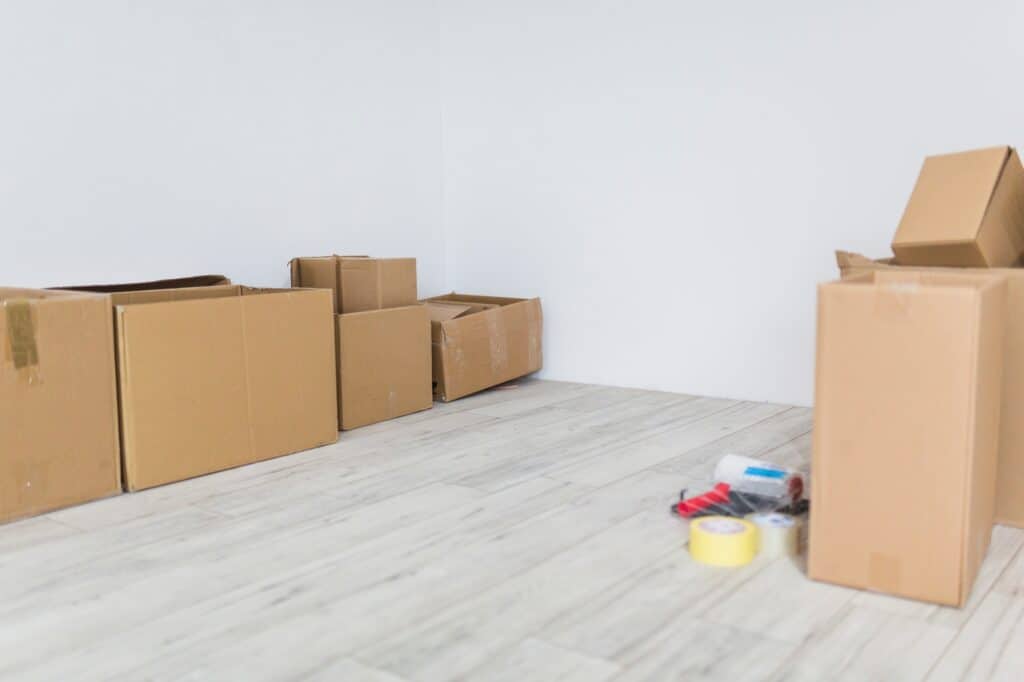Moving can be less stressful with a clear plan and a comprehensive moving house checklist. This guide explains how to create a moving checklist to keep you organised from start to finish, ensuring a seamless transition to your new home. Expect step-by-step instructions for every phase of your move, including essential tips for decluttering, hiring professional movers, and updating your new address with utility companies. With proper preparation, your moving day can be efficient and hassle-free.
Key Takeaways
- Start planning your move at least two months in advance to reduce stress, manage tasks efficiently, and ensure a smooth transition to your new home.
- Declutter your belongings early by sorting, donating, and selling items to minimise moving costs and create a fresh start.
- Communicate effectively with movers and essential contacts to ensure a smooth moving day and seamless settling into your new home.
Start and Plan Early
Starting the moving process at least two months prior helps in managing tasks efficiently. This gives you ample time to organise, declutter, and handle unexpected issues without stress. An early start allows for a systematic approach to tasks, reducing the chaos often associated with moving.
Planning involves more than just packing; it includes creating a budget, scheduling movers, and organising important documents. Breaking down the process into manageable chunks will make it less overwhelming.
Here’s a breakdown of tasks to focus on 8 weeks and 6 weeks before your move date.
8 Weeks Before Moving Day
At the eight-week mark, it’s essential to get serious about planning. Obtain at least three estimates from different moving companies to compare options and secure the best deal. Review important documents, including terms and conditions, before signing with a moving company. This is also the perfect time to create a digital folder to organise all moving-related documents, ensuring you have everything at your fingertips.
Create a comprehensive moving house checklist that includes all expenses, such as boxes, movers, and rental vans. Inquire with your employer about covering any moving costs to help reduce your budget. Having a detailed budget will prevent surprises and help you manage your finances better during this period. Use the ultimate moving checklist to ensure you cover all necessary items.
Finally, start packing non-essential items. This early start allows you to organise your belongings systematically and reduces last-minute stress. Begin with items you rarely use, like seasonal decor or infrequently used kitchen appliances. This approach reduces last-minute stress as moving day approaches.

6 Weeks Before Moving Day
Six weeks before moving day, book your moving van or professional movers. This reservation avoids last-minute hassles. Let family and friends know about your move so they can offer assistance efficiently. Their assistance can be invaluable, whether it’s packing, moving, or providing moral support.
Start collecting moving boxes and supplies early on. This will streamline the packing process and ensure you have everything you need when you start packing in earnest. Gathering supplies early ensures a smoother packing experience.
Sorting and Decluttering
Sorting and decluttering are crucial steps in preparing for a move. A thorough inventory of items aids in decluttering and estimating moving costs. Determine which items to keep, discard, donate, or sell. Clearing out unwanted items early not only reduces the volume of your belongings but also lowers your moving costs.
During this phase, clear out unwanted items into boxes for charity and rubbish. Return borrowed items to their owners and determine if any items need special packing or extra insurance. Decluttering can be a therapeutic process, allowing you to start fresh in your new home.
Use It or Lose It
As you prepare to move, it’s essential to use up perishable items to minimise waste and reduce what needs to be moved. Consider creating a meal plan that incorporates these items, ensuring they are used efficiently before moving. This not only prevents waste but also eases the transition. To make the process more enjoyable, you can use a reward system for using up perishable items. Effective planning for using perishables helps prevent waste and makes the moving process smoother.
Donate and Sell Unwanted Items
Organise items into different piles to simplify decisions on what to keep, donate, or discard. Consider donating gently used items to local charity shops as a way to declutter and help others. If you have items in good condition, prepare for a garage sale. Gather items, set fair prices, and promote the sale through social media and local community boards. Selling unwanted items can also add a bit of extra cash to your moving budget.
Research and Hire Professional Movers
Researching and hiring professional movers is a critical step. Obtain on-site estimates and written quotes from moving companies to ensure transparency. Look for companies that are members of professional organisations for added credibility. Inquire about the insurance coverage provided by the removals company to protect your belongings during the move. Keep a detailed inventory of items being moved for insurance purposes. Checking the reputation of a removals company can ensure reliability and quality service.
Confirming Arrangements
Confirm the moving company’s cancellation policy in case plans change unexpectedly. Discuss any specific needs or requests with the movers ahead of time to ensure they can accommodate them. It’s also a good idea to double-check contact details and have a backup plan. Inform close friends and family about the moving day schedule and any assistance you might need. This ensures everyone is on the same page and can help if needed.

Organising Important Documents
Gather all financial, legal, and medical records in one place to keep track of important paperwork during the move. Ensure important moving paperwork is organised and kept safely with you throughout the day for easy access.
Include important documents and medications in your essentials box for easy access during the move. Organising important documents ensures a smooth moving process with quick access to the necessary paperwork.
School Records and Medical Records
Contact your children’s new school to ensure the timely transfer of their academic records. Parents should check with the new school to understand their policy on transferring records. Forward medical records to new providers or obtain copies. Keeping these records organised and accessible will make the transition smoother for all family members.
Packing Strategies
Start packing non-essential items, like infrequently used appliances, at least two weeks before moving day. Utilise high-quality packing materials to safeguard belongings during transit. Note items of special value needing additional insurance while packing. Clearly label and number each box with contents and destination room to keep the process organised. This ensures a smoother unpacking process in your new home.
Preparing Your Old House
It’s recommended to clean your old property before leaving to ensure it’s in good condition. Perform a final walk-through to ensure nothing has been left behind. This not only helps leave a good impression but also ensures you haven’t forgotten anything important.
Ensure that all surfaces, including floors and countertops, are thoroughly cleaned. Fix any minor damages like nail holes in the walls or broken fixtures before the final walkthrough. These small efforts can make a big difference in the presentation of your old house.
Record the final meter readings for gas, electricity, and water to provide to the new owner. Ensure that you take the meter readings close to your moving date for accuracy. Notify utility providers of your moving date to avoid billing issues. Notifying utility companies ahead of time prevents surprises on your final bill.
Moving Day Tips
Wake up early on a moving day to allow time for final preparations. Inform your office that you require a day off. You need this time to oversee the move. Keep your mobile phone charged and nearby to stay connected during the move. Withdraw cash for any unexpected expenses on a moving day. Having cash on hand for emergencies during the move can be a lifesaver.
Protecting Floors and Furniture

Use protective coverings for floors and carpets to prevent damage during the move. Protecting your floors and furniture during a move helps prevent costly damages and maintains their condition. Consider using blankets or bubble wrap to protect furniture from scratches and dents during transportation. By taking these precautions, you can ensure a smoother moving experience.
Assisting Movers
On a moving day, answer movers’ questions promptly to facilitate their work. Guide movers on where to place boxes and furniture to keep your new place organised. Effective communication and guidance during the move help prevent delays and ensure everything is in the right place. This is crucial to ensure that the moving process is smooth and efficient.
Settling Into Your New Home
Once you’ve arrived at your new home, use antibacterial wipes to clean surfaces quickly. Take down the property’s meter readings. Communicate clearly with movers about where items should be placed in the new home. Meet your new neighbours to build a sense of community and inform them of your arrival. This can help you settle into your new environment more comfortably.
Unpacking and Organising
Create an unpacking timeline to efficiently manage the process. Using colour-coded labels can help identify the contents and placement of boxes quickly. Set aside boxes for reuse or throw them out after unpacking.
Establish a designated area for items that need to be returned or exchanged, ensuring they don’t get mixed up with other belongings. This dedicated space will help you keep track of items that require attention and prevent them from being misplaced. Regularly review and manage this area to facilitate prompt returns or exchanges, making the moving process more organised.
Changing Locks and Security
One of the first steps to take after moving into a new home is to change the locks. To enhance security, consider installing a security system and checking smoke alarms. By changing locks and ensuring all safety measures are in place, you can feel secure in your new home. This adds an extra layer of protection for your family and belongings.
RECOMMENDATION
When settling into your new home in Hounslow, start by cleaning surfaces, noting meter readings, and getting to know your neighbours for a smoother transition. Prioritise unpacking with a clear plan, organise items efficiently, and enhance security by changing locks and checking safety systems to ensure a safe and comfortable start.
Updating Address and Utilities
Notify your employer, children’s school(s), and emergency contacts about your address change. Inform banks, credit card companies, brokerage firms, and utility companies of your new address. Additionally, fill out a change-of-address form to facilitate the transition of your utilities to your new home.
Ensure that your internet service is set up before moving in to avoid disruptions. You need to re-register on the Electoral Roll when you change your address. Updating your address with the council is necessary to avoid issues with your council tax.
Updating your address with financial institutions is crucial for maintaining accurate records and ensuring that bank records reflect your new address. This information is used for security checks to verify your identity, so timely updates can prevent potential issues. Informing your contents insurance provider about when and where you’ll be moving ensures that your possessions are covered during and after your move.
Effective communication with financial institutions and insurance providers helps maintain accurate records and ensures your possessions are protected. By notifying these institutions in advance, you can prevent any service disruptions and ensure a smooth transition to your new home.
Summary
Moving to Hounslow doesn’t have to be a stressful experience. By following this comprehensive moving checklist, you can stay organised and ensure that nothing is overlooked. From starting early and planning effectively to hiring professional movers and updating your address, every step is crucial for a successful move.
With proper preparation and a well-thought-out plan, your move to Hounslow can be smooth and hassle-free. Embrace the adventure of settling into your new home, knowing you’ve covered all your bases. Here’s to a fresh start and a new chapter in Hounslow!
Frequently Asked Questions
How early should I start planning my move?
Start planning your move at least two months in advance to keep everything manageable and stress-free. Getting a head start will set you up for a smoother transition!
What should I do with perishable items before moving?
To minimise waste and lighten your load, use up perishable items by creating a meal plan before your move. This strategy not only helps you make the most of your ingredients but also makes your transition smoother!
How do I choose a reliable moving company?
To choose a reliable moving company, obtain on-site estimates, request written quotes, and ensure they are members of professional organisations with proper insurance coverage. Taking these steps will help you make a confident choice for your move!
Why is it important to update my address with financial institutions?
It’s vital to update your address with financial institutions to keep your records accurate and avoid any security issues or service interruptions. Stay proactive and secure your financial health!
What should I do on moving day to ensure everything goes smoothly?
To ensure a smooth moving day, wake up early, stay organised, keep your phone charged, and communicate clearly with your movers. Being prepared and having cash on hand for surprises will help everything go off without a hitch!






